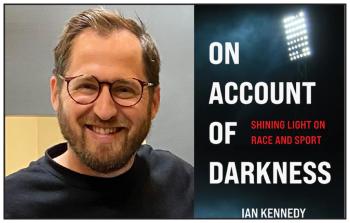Image Caption
Summary
Local Journalism Initiative Reporter
Windspeaker.com
When author Ian Kennedy set out to write On Account of Darkness: Shining Light on Race and Sport, he did so with the goal of writing an historical take on the area where he was raised in southern Ontario.
On Account of Darkness takes a personal look at the sports history of the Chatham region. It documents the stories of marginalized sports teams and players over the past several centuries.
The book’s opening passages highlight a centuries-long history of racial tension between Indigenous and settler population. The book also touches on the sports history of Japanese and Black Canadians in the region, with Kennedy conducting interviews with dozens of athletes, their families, coaches, and friends to help contextualize the history.
Kennedy hopes that readers will be able to use his book as an educational tool to learn more about the history of sports within Canada that they might be unfamiliar with, or to expand on their previous knowledge and understanding.
“The idea with the book is to be an anti-racist text that preserves stories and provides that opportunity in that space for others to hear the perspectives and the experiences that aren't our own,” he said.
Kennedy grew up in the Chatham region near the Walpole Island First Nation. He said his perspective of the local Indigenous population as a white person was one that was clouded by misinformation and stereotypes.
“I’ve placed myself in these stories as someone who was, admittedly, oblivious and part of the problem for many years,” Kennedy wrote in the book’s introduction. But, he says, he’s been changed.
Kennedy says it’s important to understand the historical context of the local Indigenous populations in order for people to comprehend modern day discussions of race.
“Because if we can't connect with each other, to understand different backgrounds and how residential school affected people… and how our government and our church and our sports communities have impacted the way that we see each other, we can't be good allies.”
Kennedy notes the hypocrisy of “Touting the brave Chief Tecumseh who fought with local soldiers in the War of 1812, while ignoring the disenfranchisement and genocide of Indigenous peoples.”
On Account of Darkness hit shelves in May and is published by Tidewater press. It’s available in major bookstores and online retailers and is already making an impact.
“On Account of Darkness is a book we can all learn from,” reads a testimonial from Indigenous hockey player Brigette Lacquette. She grew up in the remote Métis community of Mallard, Man. and helped win a silver medal for Canada at the 2018 Pyeongchang Winter Olympics.
“Overcoming obstacles such as racism as well as prejudice… these are the truths that need to be heard across the globe.”
Kennedy says it all ties together “and understanding our past is crucial for us to fix those issues and make sport a place where everyone can participate and where it becomes a healthy, healing, fun environment to be rather than this hyper-competitive space that it is right now,” he said.
Kennedy writes in the opening of the book, “The area’s whiteness has created a hostile environment for visitors. Like any home team, we’ve yelled, we’ve banged on the glass, we’ve used our home-field advantage against those who try to belong here with us, even those who were here before we arrived.”
Kennedy hopes that readers will be inspired to do their own research beyond the conclusion of his book.
“I want this just to be a beginning to the conversation, because I recognize that I come from a place of privilege that I can say things freely at this point without some of the backlash that others might receive. So that's where I can amplify voices and hold that space.”
Local Journalism Initiative Reporters are supported by a financial contribution made by the Government of Canada.

